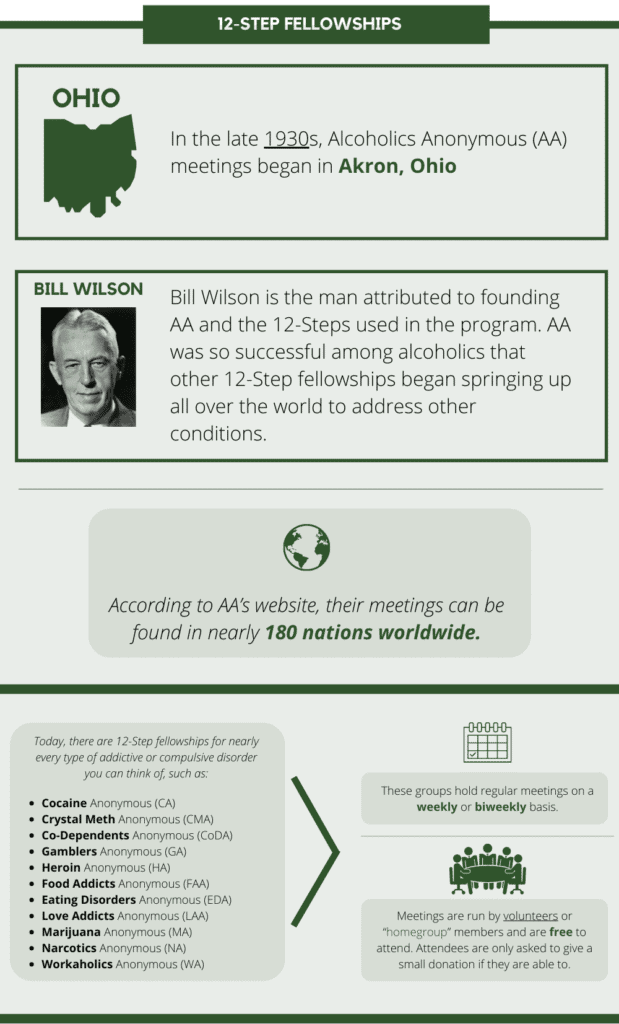12-Step recovery programs such as Alcoholics Anonymous (AA) and Narcotics Anonymous (NA) have been around for nearly 90 years. They have helped millions of people get sober and get their lives back on track. However, since these fellowships have grown in size, additional advancements have been made in the field of addiction treatment. As a result, rather than the rooms of AA, rehab is usually the first place people go when they decide to get sober.
Rehab helps people uncover the underlying causes of their addiction, work through trauma, and develop healthy coping mechanisms. While rehab is an essential part of addiction recovery, it’s important to have additional resources at your disposal to help you sustain your sobriety. By combining 12-Step recovery with a drug treatment program, you allow your mind, body, and spirit to heal from addiction while accepting the fact you may need additional support for the rest of your sobriety.
What Are 12-Step Fellowships?
In the late 1930s, Alcoholics Anonymous (AA) meetings began in Akron, Ohio. Bill Wilson is the man attributed to founding AA and the 12-Steps used in the program. AA was so successful among alcoholics that other 12-Step fellowships began springing up all over the world to address other conditions. According to AA’s website, their meetings can be found in nearly 180 nations worldwide.[1]
Today, there are 12-Step fellowships for nearly every type of addictive or compulsive disorder you can think of, such as:
- Cocaine Anonymous (CA)
- Crystal Meth Anonymous (CMA)
- Co-Dependents Anonymous (CoDA)
- Gamblers Anonymous (GA)
- Heroin Anonymous (HA)
- Food Addicts Anonymous (FAA)
- Eating Disorders Anonymous (EDA)
- Love Addicts Anonymous (LAA)
- Marijuana Anonymous (MA)
- Narcotics Anonymous (NA)
- Workaholics Anonymous (WA)
These groups hold regular meetings on a weekly or biweekly basis. Meetings are run by volunteers or “homegroup” members and are free to attend. Attendees are only asked to give a small donation if they are able to.
During these meetings, members share their experience, strength, and hope with one another through their knowledge of the 12-Steps to help others who are struggling with addiction. 12-Step fellowships are one of the most popular recovery-based groups individuals participate in after drug treatment.

Benefits of Combining 12-Step Groups With Drug Treatment
While you are in rehab, your treatment center may take you to 12-Step meetings in the community. You will also be encouraged to continue attending 12-Step meetings after finishing drug treatment. This is because these groups can help you stay sober and lead a healthy, functional life after addiction. Here are two top benefits of combining 12-Step groups with drug and alcohol treatment.
Incorporate Spirituality Into Your Recovery
Evidence-based therapy is a crucial part of addiction treatment. Effective treatment should be individually tailored to meet a person’s specific needs and consider his or her beliefs, culture, and background. However, many of these therapies are behavioral or thought-based. Unless you attend a faith-based rehab center, spirituality may not play a huge role in the treatment process.
With that said, spirituality can play a major role in the recovery process as a whole. Even researchers have found that spirituality or religion in recovery can improve a person’s health and quality of life. People with a strong sense of faith report higher levels of satisfaction in life, greater happiness, fewer traumatic events, and fewer negative psychosocial consequences.[2]
While 12-Step programs are not considered religious, they do operate on a spiritual basis. You are encouraged to find and develop a relationship with a Higher Power of your own understanding. So long as your Higher Power works for you and helps you stay sober, it is sufficient. The program also encourages meditation and connecting with others on a spiritual level. All of these aspects of 12-Step programs can help you grow your spirituality, reduce stress, and improve your quality of life.
Gain Accountability and Friendship That Extends Beyond Treatment
Rehab typically only lasts 30, 60, or 90 days. Addiction recovery, however, is a lifelong journey. If you fail to continue addressing your addiction, you may become susceptible to relapse. Of course, it isn’t always feasible to pay for ongoing counseling or group therapy sessions–especially if you don’t need them. Instead, you can continue your recovery by attending 12-Step programs after drug treatment ends.
By actively participating in a 12-Step program, you surround yourself with other like-minded individuals who can relate with you, provide you with fellowship, and give you support when you need it the most. 12-Step meetings are free to attend, located in nearly every city in the country, and easily accessible to anyone. These meetings can play a vital role in your long-term sobriety. They can even help you prevent relapse and avoid going to rehab two or more times.
When in early recovery, it will take time for you to adjust to living sober. You’ll have to find new ways to fill your time and new people to spend that time with. 12-Step programs are full of people with similar goals and outlooks on life as you. You’ll never feel alone or unsupported while part of a 12-Step fellowship.

Get The Care You Need and Deserve
Woburn Addiction Treatment is a leader in the addiction treatment field, with proven success in facilitating long-term recovery. Our team of top clinical & medical experts specializes in treating addiction coupled with mental illness, ensuring that each person receives individualized care. Call us – we’re available 24/day, 7 days/week.
Start Drug and Alcohol Treatment Today
Here at Woburn Addiction Treatment, we encourage our patients to participate in 12-Step recovery programs both during and after drug treatment. While our treatment programs are unlike any other in the state with some of the highest rates of success, we know that recovery does not end with a treatment completion certificate. It is a life-long journey that requires dedication, support, and accountability. If you or a loved one are struggling with addiction, we can help. Call us now to get started. References:


